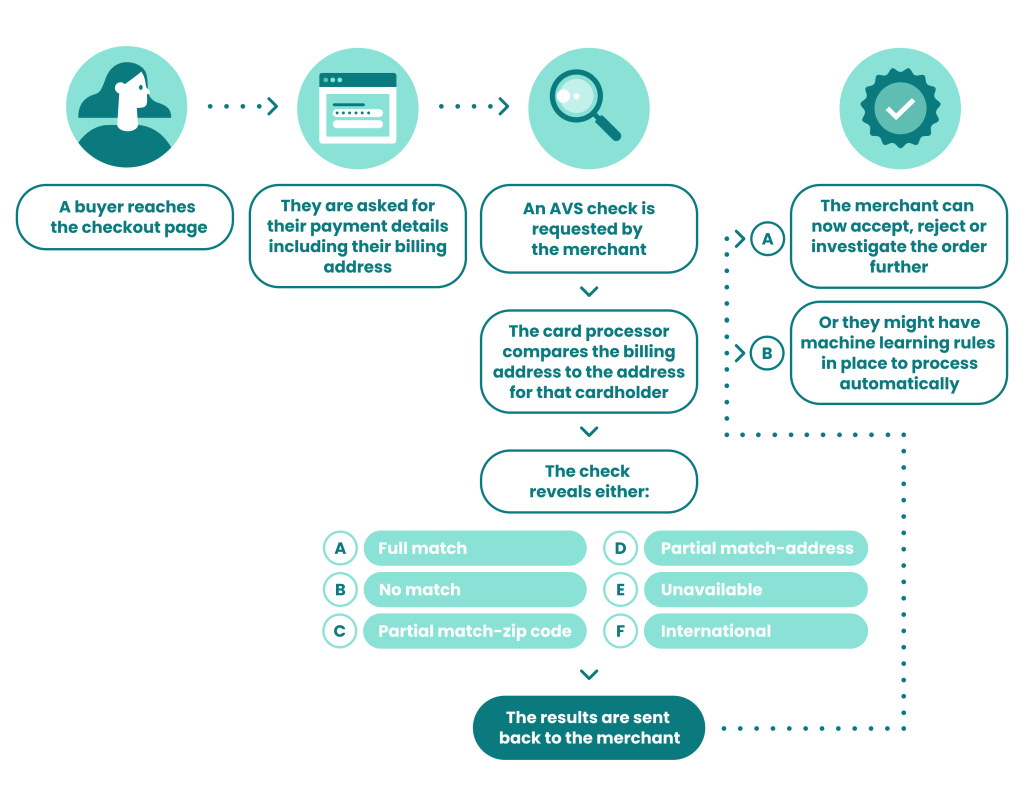What Is AVS – the Address Verification Service?
The Address Verification Service (or AVS) is a service set up by credit card processors that allows merchants to verify the ownership of a card when it is used online by a customer. It works by asking the customer for their address during a purchase, which is then checked against the records of their issuing bank.
This is one of several measures introduced to stop criminals from using stolen debit and credit cards. If there is a mismatch, the merchant is alerted, but they can decide to go through with the transaction anyway.
AVS was created by Mastercard and is available, at the time of writing, for customers in the USA, Canada, the UK, Australia, and New Zealand. It’s supported by Visa, Mastercard, and American Express, as well as Discover.
Customers on the receiving end of an AVS decline will often see a pending charge on their account, which has to be cleared with their bank.
If you are a merchant who uses AVS checks, you should ask your customers to be precise about their billing address. Also, make sure you let them know that, in case of a decline, they might notice a reserved sum in their account, but this will clear soon and they won’t actually be charged for any transactions that have been declined.
How Do Address Verification Systems Work?
AVS systems work to protect cardholders (and merchants) in the following way:
- A buyer reaches the checkout page.
- They are asked for their payment details, including their billing address.
- An AVS check is requested by the merchant.
- The card processor compares the billing address to the address for that cardholder.
- The check reveals one of the following:
- full match
- no match
- partial match-zip code
- partial match-address
- unavailable
- international
- The results are sent back to the merchant.
- The merchant can now accept, reject or investigate the order further.
- …or they might have machine learning rules in place to process it automatically.

We should note that address verification service is not available for cards issued in a non-supported country, and hence declines should be managed carefully.
Customers also tend to move along or make purchases from addresses not registered with their bank, or they might not be as verbose with an online transaction as with a delivery regarding their address.
The response codes tend to give some context around such mismatches, so the merchant can determine if they are dealing with an honest mistake or a fraudster with a stolen credit card.
AVS is an efficient deterrent in case the fraudster only knows the credit card number but no other data associated with the customer.
Unfortunately, this is not that hard to overcome, as criminals can find out the cardholder’s address with fairly little effort. So, make sure you look for additional signals too, such as mismatched delivery addresses, which could be a drop, and risky email addresses.
What Is an AVS Decline?
An AVS decline happens when the address verification service check fails and the merchant or processor rules are set up to decline such transactions.
If the customer is legitimate, this constitutes a false positive. Time and again, data has shown how much legitimate online buyers dislike having their transactions rejected, which has become known as “customer insult rate” and needs to be balanced in order not to drive one’s customer base away.
What adds to the confusion is that the customer will still see an authorization charge on their card – as available funds are reserved before the check itself resolves.
This normally clears in five to seven business days but in some cases, it may take up to 30 days, and the customer will need to call their issuing bank to investigate and/or resolve it earlier. Transactions such as this are declined on the merchant side, and no reversals are possible.
For this reason, merchants should clearly communicate on your checkout page that customers are advised to be careful and accurate with their billing information, so as to avoid any confusion.
Why Is the Address Verification Service System Important?
The Address Verification System was developed specifically to help MOTO merchants – meaning “mail to order/phone to order” – with transactions, but it’s since become a key feature of all card-not-present (CNP) fraud detection systems.
For customers in supported countries, the Address Verification Service gives you an additional line of defense that’s reliable in keeping at bay low-effort attacks to steal and use your credit card fullz.
For merchants, the AVS response signal is a useful piece of information, which should be weighed into your risk scoring. As a result, you are better protected from chargeback requests, which are frustrating for customers and costly for merchants – up to 3.60x the money lost in the transaction, as well as harming your chargeback rate with banks.
Regardless of and in addition to the outcome of the AVS check, you can use the provided billing address to match the customer’s IP address location using a GeoIP database, as big distances can indicate fraud (or travel – this is up to you to determine based on other data points).
In other words, this tells you how far the customer seems to be from the country where the card was issued and the address where it was registered.
When in doubt, it’s best to reach out to the customer via email or phone to verify them, as AVS is just as prone to false declines as any other system.
Finally, as always, we would advise not to rely on one single point of defense against fraudsters either. AVS can be useful as one of several data points that will inform your choices and protection.
It’s not enough to just use AVS. A more detailed vetting process is needed to ward off those savvy fraudsters. Explore methods to spot high risk customers.
Read more








